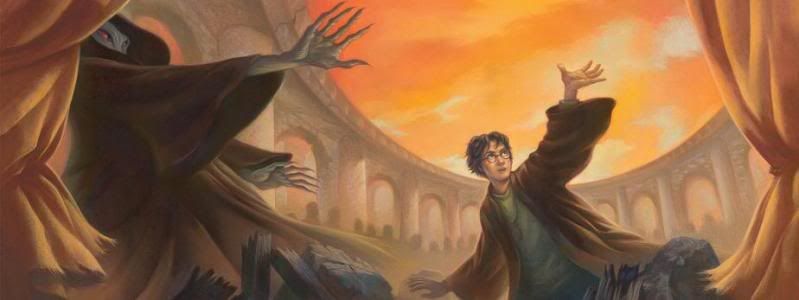
Disclaimer: This post was written last week and is not Leah Burgin’s column in today’s Daily, which, incidentally, is about the same exact thing. Sort of.
Once upon a time, I refused to read Harry Potter, and only relented because a friend had lent it to me― or pressed it upon me, rather, with a “this is really good!†of which I was skeptical (either it had not yet reached peak popularity, or I was simply oblivious)― and my mother insisted it’d be rude to not at least attempt to read it. So I read the first book, then the second, and the third, until at some arbitrary point in time, I began eagerly awaiting the publication of the next successive volume with ever-increasing fervor.
The world Rowling crafts is wide and all-encompassing, with rules and laws built into it that are illogical to reality but entirely logical within its own fictional framework, that are structured and regular but leave room for inferences and implications and the imagination to build something for itself. It separates itself from the mundane, but suggests that the magical world exists simultaneously as an ordinary one, and thus can actually exist; this, at least by my reckoning, is one of the things that makes the series so accessible to its audience― to children, to those who had read it as children, to people who just want to enjoy a nice escapist bit of fantasy. It isn’t merely the sum of the hype and the massive franchise built off seven books. It has shaped the youth of a great many people- it has certainly factored into mine. Don’t pretend you were entirely unaffected.
Harry Potter never did make it into my conscious list of favourite books, however. I preferred to state (with dignity), publicly and to myself, that on my list were the likes of Tolkien and oh, C.S. Lewis, maybe, and perhaps a bit of O. Henry tossed in there for good measure (and to balance out the fact that I enjoyed reading fantasy, etc). Which I genuinely did, of course, I did and do like them very much, but the language of Harry Potter is easier to read, its characters more easily relatable, its content more interesting. It is, for the same amount of effort expended, more enjoyable. Harry Potter is not, understandably, generally considered high literature; they are children’s books, written for enjoyment and immersion in said enjoyment, rather than an introspective discourse about the workings of societal values and the nature of intangible ideals. But what begins as a simple narrative about a boy in a tale of good and evil blossoms out into an intricate and multifaceted web of struggles and intrigues.

And this leads us to the present argument: Harry Potter and the Deathly Hallows, the final installment. We spent all the space before its release rereading the previous books and hypothesizing what would occur in that momentous, precipitous conclusion that would answer all our questions and tie all the loose ends together. What happened was not entirely unexpected, but rather disappointing all the same, to be honest. Realizing that there was only so much time for all the remaining plot points to occur, Rowling must have squeezed everything else into the limited space of 700+ pages in order to bring everything to a logical conclusion. Which… it did, conclude logically, that is, after a fashion, but at least to me, the ending was too contrived, and quite unsatisfactory. The remaining protagonists seem to be all paired off neatly with one another by the end. Then comes the epilogue, in which we see said characters in their now-married couples with their multitudes of children, happy as can be in their domestic bliss. It might just be me, but there could be better and more convincing ways to end such a complex narrative. As a response to the culmination of 10 years’ emotional involvement on part of the readers? Ouch.
Least satisfactory of all is the matter of Severus Snape. The tragic antihero, who plays perhaps the most pivotal role in the entire narrative, whose entire life is one of hardship and of being loathed by everyone around him no matter what he does, does not receive the ending he deserves. He is perhaps one of the most complex characters in the entire series. Snape is caught between moral dilemmas, treads a precarious line, and yet manages to do the right thing (in addition to maintaining a stoic facade, remaining a vaunted intellectual in academia, and being Alan Rickman). And what does he get? He dies, and in a rather undignified way, to boot.
Well.
TChen will be the one sobbing all through the end of the last film.


Leave a Reply
Be the First to Comment!